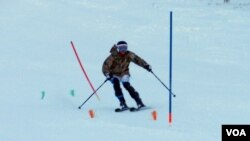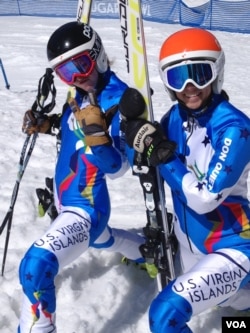KETCHUM, IDAHO —
Next month, Sochi, Russia will host athletes from about 90 nations at the Winter Olympics. Some of the countries sending athletes might surprise you.
Not only will the celebrated Jamaican bobsledders be back, but so will skiers from countries that rarely, if ever, see snowfall, such as Brazil, Zimbabwe and Thailand. Olympic athletes also hail from countries like Peru which have snowy peaks, but not much of a winter sports tradition.
And Denmark, where it gets cold certainly, but there's a conspicuous lack of mountains. Australian, Peruvian and Virgin Islands winter Olympians have found a snowy training ground in the American West.
Alpine skier Jasmine Campbell, who was born in the U.S. Virgin Islands and will carry its flag in Sochi, is one of them.
The 22-year-old college student takes her quest very seriously. She aims to compete in the slalom and giant slalom events.
"It's just basically an 18-hour job where I'm always thinking about skiing," Campbell said. "I wake up in the morning, before going upstairs, I watch a ski video. When I go to bed at night, I watch a ski video. During the day, I have double training sessions."
Campbell took up ski racing soon after her family moved to the northwest U.S. state of Idaho from the Caribbean when she was around 10 years old. It did not take long before she was dreaming of being on the U.S. ski team.
A high school injury derailed her ambitions for a while but these days Campbell exceeds the minimum standards to ski at the Olympics. But she does not think she could qualify for the highly competitive Team USA.
Her father, who skied in the 1992 Winter Olympics on the Virgin Islands team, encouraged his daughter to hold on to her Olympic dreams by following his path.
"It was probably the coolest two weeks of my entire life, barring having kids and getting married," said John Campbell. "I'm really excited for Jasmine to have this opportunity."
Decades ago, territories such as the U.S. Virgin Islands, Bermuda and Hong Kong successfully petitioned the International Olympic Committee for the right to field teams separate from their mother countries.
This year, Togo, Tonga, East Timor, Malta and Zimbabwe are set to make their debuts at the Winter Games.
"We're seeing more and more entries from these parts of the world," said Janice Forsyth, who directs the International Center for Olympic Studies at the University of Western Ontario.
Forsyth says she's noticed a dogged effort by the IOC to expand interest and visibility of the Winter Games by including more predominantly warm weather countries.
"Because of course, the more countries that participate in the Games - especially in different parts of the world - the more spectators they get, which means more revenue in terms of broadcasting rights," she said. "There's a real business incentive behind this interest to get more and more nations, especially tropical nations, into the Olympic Games."
Forsyth is not surprised some athletes look for alternate routes into the Games via tropical nations. But residency requirements are designed to foil interlopers. In the case of the U.S. Virgin Islands, a relocated winter athlete would have to live for three years in a place where it never snows.
Jasmine Campbell qualifies based on skill and being born in the Virgin Islands. She says she proudly wears the uniform of a nation she has not lived in for many years.
"I almost prefer doing it this way because I really get to recognize and honor a part of me that never really gets to be brought up," she said.
Many of the other athletes who will represent tropical countries next month have memorable back stories.
The South Pacific island nation of Tonga’s first Winter Olympian is a former rugby player turned luge competitor. He legally changed his name to Bruno Banani, the name of a German underwear company sponsor.
Thailand will be represented by an alpine skier actually raised in Britain. She is much better known for her other career as the violinist Vanessa-Mae.
Mexico will be represented in Sochi by a German prince who was born in Mexico. At age 55, Hubertus von Hohenlohe will be the second oldest athlete ever to compete in the Winter Games. The oldest was a 58-year-old Swedish curler at the 1924 Winter Olympics in Chamonix.
Not only will the celebrated Jamaican bobsledders be back, but so will skiers from countries that rarely, if ever, see snowfall, such as Brazil, Zimbabwe and Thailand. Olympic athletes also hail from countries like Peru which have snowy peaks, but not much of a winter sports tradition.
And Denmark, where it gets cold certainly, but there's a conspicuous lack of mountains. Australian, Peruvian and Virgin Islands winter Olympians have found a snowy training ground in the American West.
Alpine skier Jasmine Campbell, who was born in the U.S. Virgin Islands and will carry its flag in Sochi, is one of them.
The 22-year-old college student takes her quest very seriously. She aims to compete in the slalom and giant slalom events.
"It's just basically an 18-hour job where I'm always thinking about skiing," Campbell said. "I wake up in the morning, before going upstairs, I watch a ski video. When I go to bed at night, I watch a ski video. During the day, I have double training sessions."
Campbell took up ski racing soon after her family moved to the northwest U.S. state of Idaho from the Caribbean when she was around 10 years old. It did not take long before she was dreaming of being on the U.S. ski team.
A high school injury derailed her ambitions for a while but these days Campbell exceeds the minimum standards to ski at the Olympics. But she does not think she could qualify for the highly competitive Team USA.
Her father, who skied in the 1992 Winter Olympics on the Virgin Islands team, encouraged his daughter to hold on to her Olympic dreams by following his path.
"It was probably the coolest two weeks of my entire life, barring having kids and getting married," said John Campbell. "I'm really excited for Jasmine to have this opportunity."
Decades ago, territories such as the U.S. Virgin Islands, Bermuda and Hong Kong successfully petitioned the International Olympic Committee for the right to field teams separate from their mother countries.
This year, Togo, Tonga, East Timor, Malta and Zimbabwe are set to make their debuts at the Winter Games.
"We're seeing more and more entries from these parts of the world," said Janice Forsyth, who directs the International Center for Olympic Studies at the University of Western Ontario.
Forsyth says she's noticed a dogged effort by the IOC to expand interest and visibility of the Winter Games by including more predominantly warm weather countries.
"Because of course, the more countries that participate in the Games - especially in different parts of the world - the more spectators they get, which means more revenue in terms of broadcasting rights," she said. "There's a real business incentive behind this interest to get more and more nations, especially tropical nations, into the Olympic Games."
Forsyth is not surprised some athletes look for alternate routes into the Games via tropical nations. But residency requirements are designed to foil interlopers. In the case of the U.S. Virgin Islands, a relocated winter athlete would have to live for three years in a place where it never snows.
Jasmine Campbell qualifies based on skill and being born in the Virgin Islands. She says she proudly wears the uniform of a nation she has not lived in for many years.
"I almost prefer doing it this way because I really get to recognize and honor a part of me that never really gets to be brought up," she said.
Many of the other athletes who will represent tropical countries next month have memorable back stories.
The South Pacific island nation of Tonga’s first Winter Olympian is a former rugby player turned luge competitor. He legally changed his name to Bruno Banani, the name of a German underwear company sponsor.
Thailand will be represented by an alpine skier actually raised in Britain. She is much better known for her other career as the violinist Vanessa-Mae.
Mexico will be represented in Sochi by a German prince who was born in Mexico. At age 55, Hubertus von Hohenlohe will be the second oldest athlete ever to compete in the Winter Games. The oldest was a 58-year-old Swedish curler at the 1924 Winter Olympics in Chamonix.





